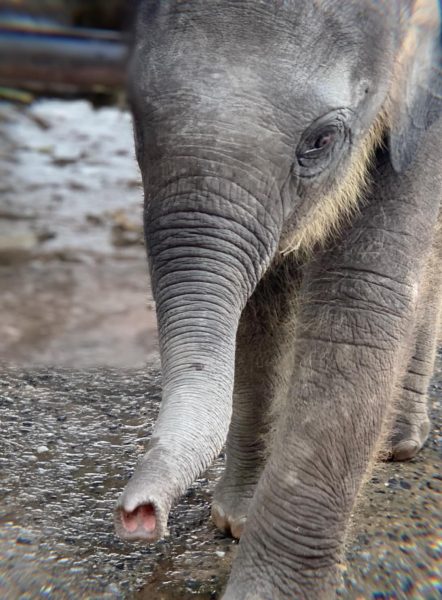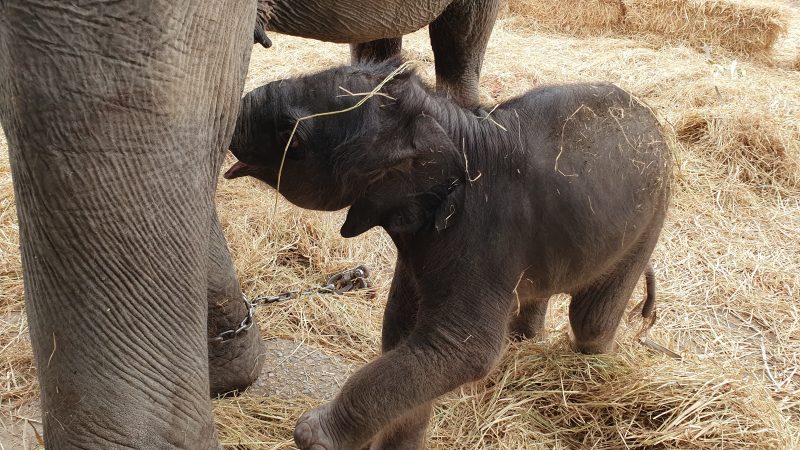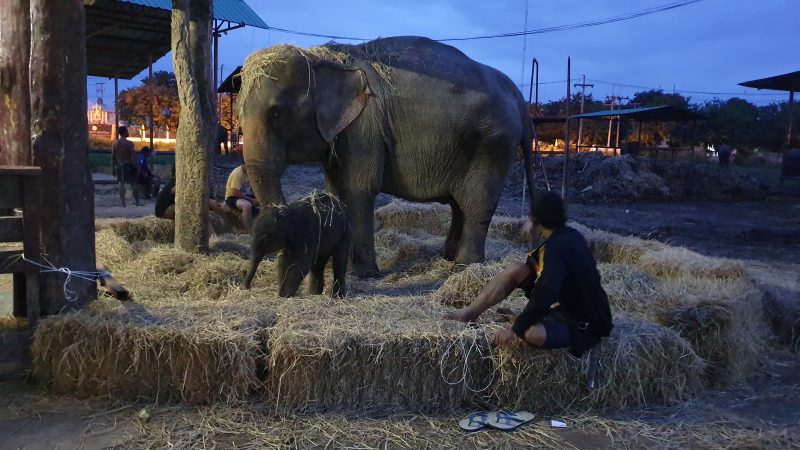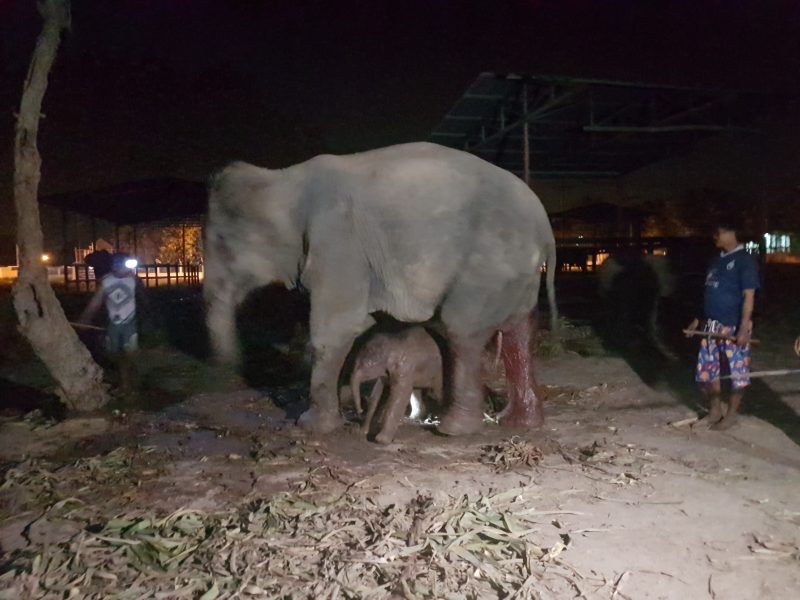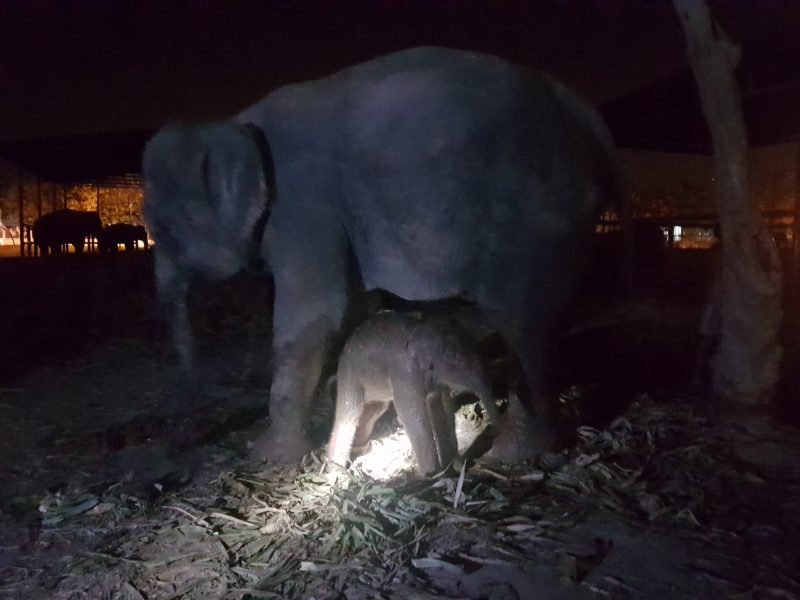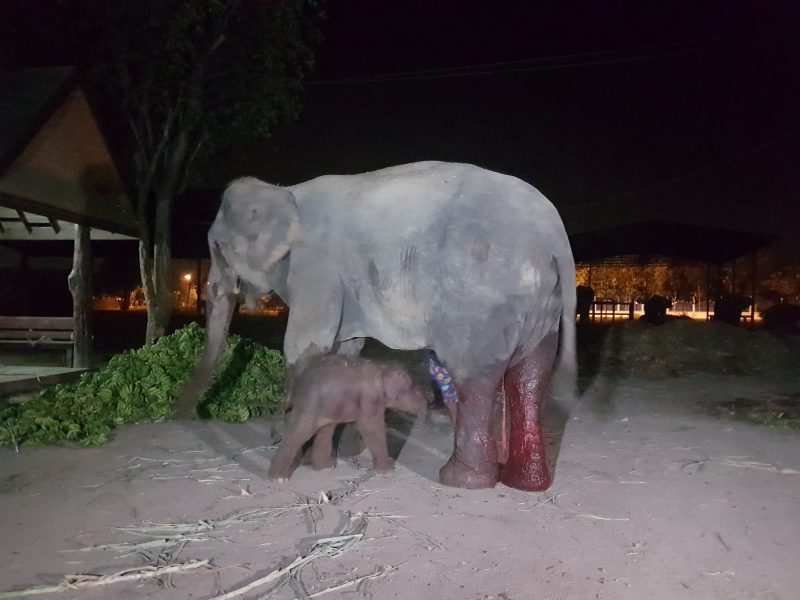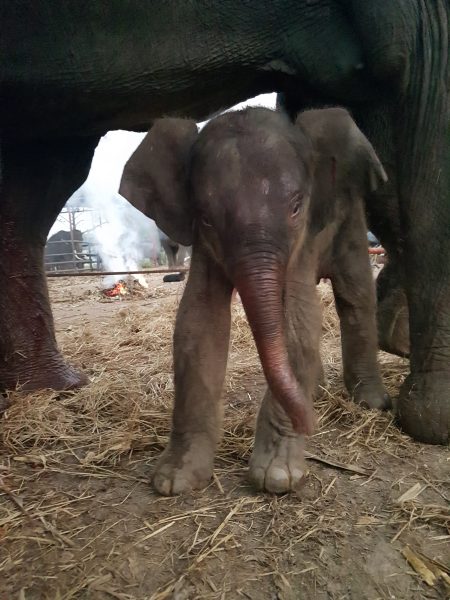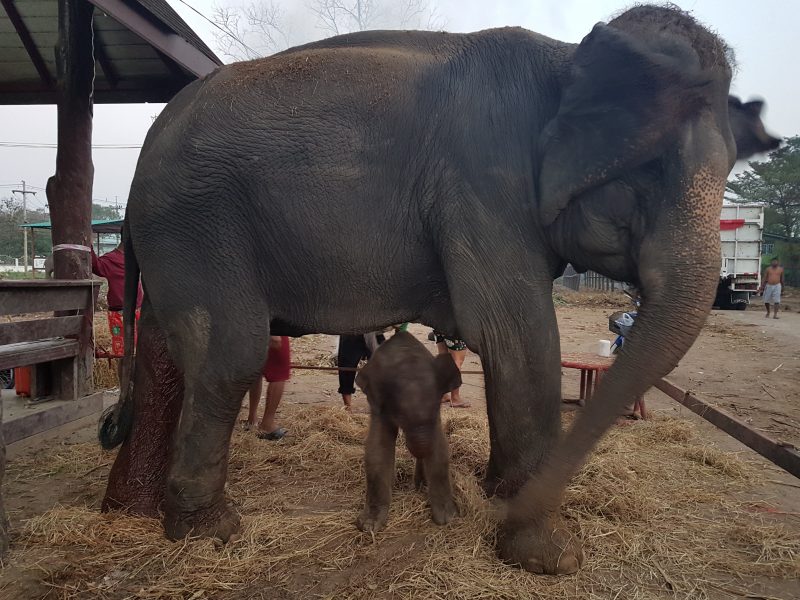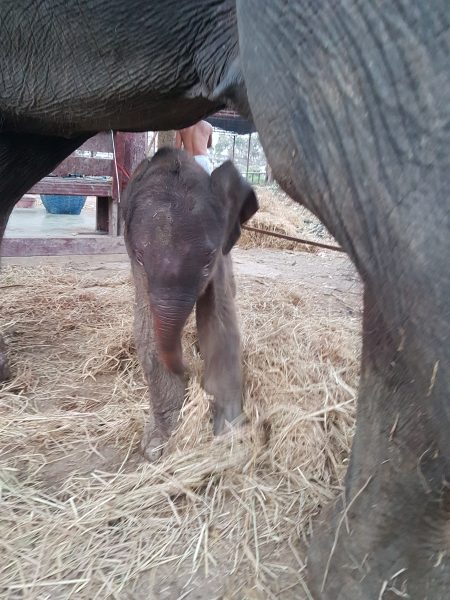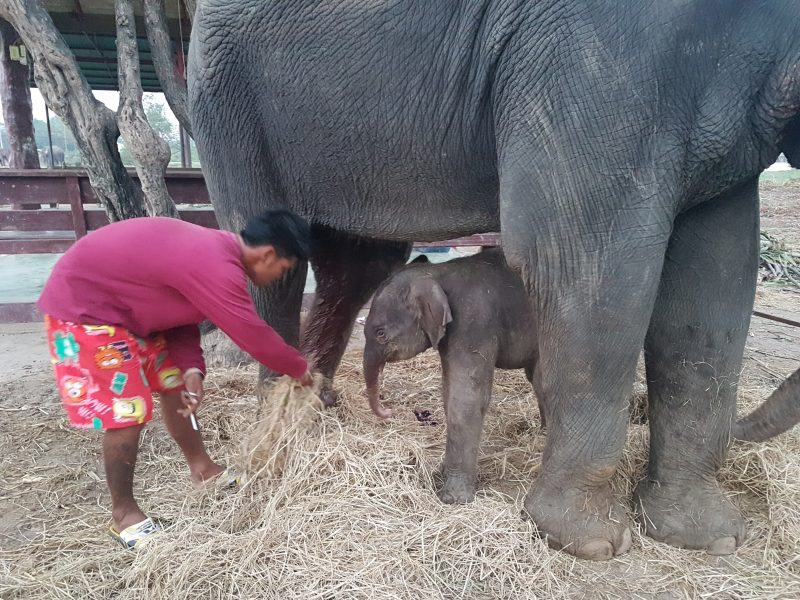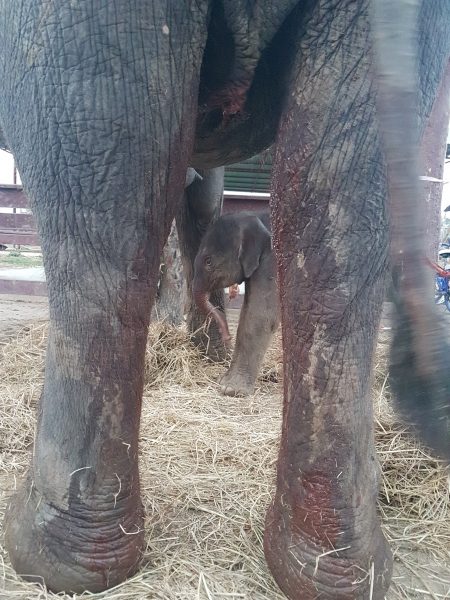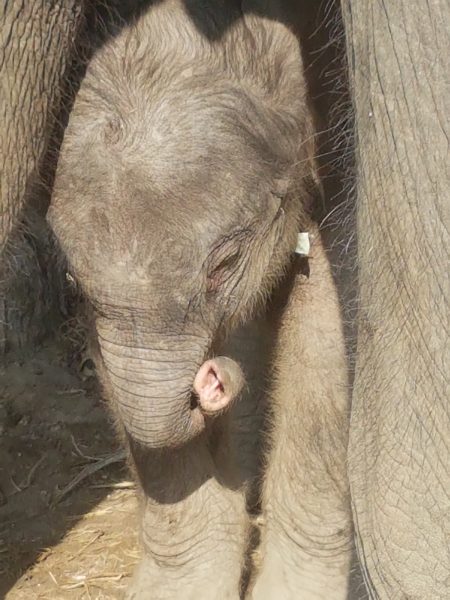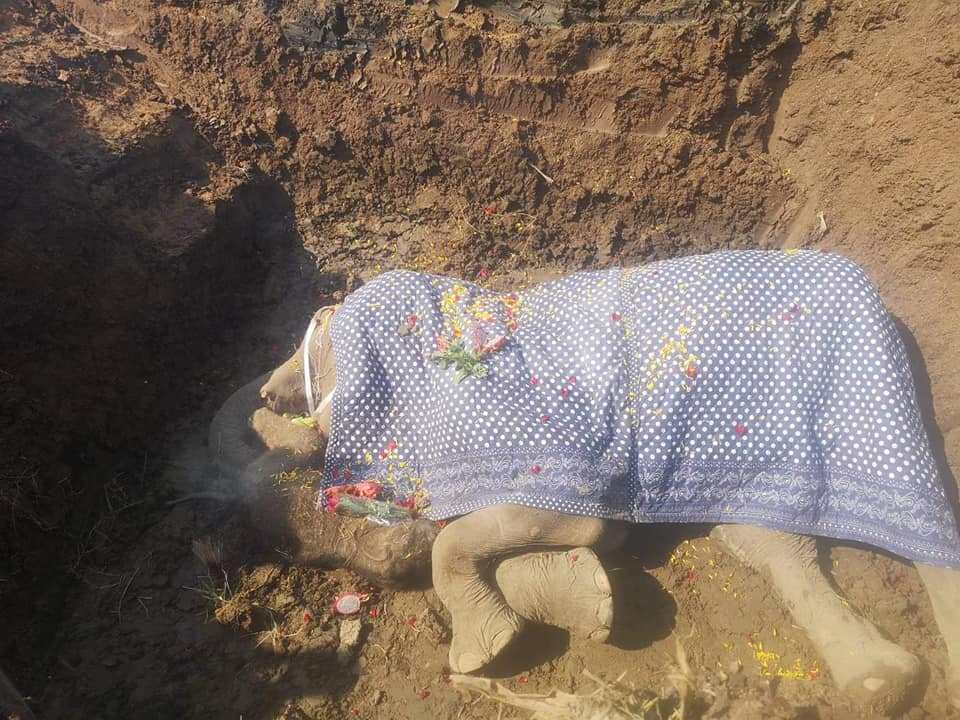Births 2019
Birth No. 79 - 5 December 2019
Welcome to the world number 79! On the 5th of December 11.49pm Sopah gave birth to her fifth baby, a girl.
Sopah’s baby has been named Si Karuna (พังศรีกรุณา) which means “The Princess of Kindness and Compassion”.
To understand the combination of the two words ‘si’ + ‘karuna’, we have to refer back to the concept of universal mythical patterns that are expressed in an endless variety of forms in the world’s art and literature. The root word here is ‘karuna’ (กรุณา), which means ‘compassion’.
So, when used to name a female elephant, that should instantly draw one’s attention to the goddess of kindness and compassion, whose many different aspects as a figure of the ‘divine feminine’ are presented in sacred art all over the world. In Asia, the two leading versions of the goddess of compassion over the past two thousand years are the Goddess Tara and the Bodhisattva Kuan Yin.
How does that influence the meaning of a name when combined with word ‘si’ (ศรี)? ‘Si’ means ‘that which is good and beautiful’, although not in the ordinary sense. ‘Si’ can be associated with a clan, a tribe, a community, a town, a city, or even a state in the ancient context. More often, the ‘si’ of an ancient state would have referred to a princess or a royal consort, and would have been linked with the metaphorical associations of ‘the jewel of the kingdom’ or ‘the jewel of a royal house’. Thus, the combination of the mythical symbols of ‘princess’ and ‘goddess’.
Thanks Lalipa Nilubol for the translation.
Birth No. 78 - 4 September 2019
Doksanu gave birth to her fifth baby at 3.50am this morning. Baby had trouble standing on her own but with the help of mahouts and a pakamah she was soon walking on her own! The baby has been named Pang Kritsana (พังกฤษณา)… “The Kritsana Nymph”, or “The Kritsana Fairy”, or “The Kritsana Protectress”, or “The goddess who resides in the Kritsana tree”. Nature spirits, also known as elementals, form the bedrock of the world’s ancient folk beliefs. In Southeast Asia and the Indian Subcontinent especially, large, old trees that release fragrance are believed to be the dwelling places of powerful spirits and guardians. The Kritsana is one such tree with a great abundance of folkloristic associations. There are few trees in this world known for producing what is scientifically described as the ‘aromatic portion’, which in this case is referred to as agarwood or agar (Hindi), aloes wood (English), and kritsana (Thai). The scientific name is Aquilaria, a tree genus indigenous in India, Bangladesh, China, and throughout Southeast Asia all the way to the Philippines. Aloes wood or Kritsana contains patches of oleoresin deposits, a product with a trading history in present-day Thailand over the past 700 years. Kritsana has always been prized for use as incense and perfumes. Kritsana is also known for its comforting and pleasant-tasting medicinal properties. Kritsana has been commercially presented (the modern term would be ‘marketed’) in the form of chips, splinters, and blocks. It is an ancient belief that if those going into the forest to look for wild materials spend the night under the shade of a Kritsana tree, no wild animal can harm them during their sleep. It is no coincidence that the Kritsana is believed to possess such protective qualities. For the question then follows, “What is the relationship between the Kritsana and the Asian elephant?” The answer is…both are endangered. Today, the Aquilaria, from which the Kritsana is produced, is an endangered tree genus famous all over the world for its production of the fragrant agarwood or aloes wood (Kritsana). Although the agarwood product is scarce, it is in high demand in the international market. Poor management and indiscriminate harvesting of the agarwood from the wild have been threatening the survival of these trees. Pang Kritsana, or “The Lady of the Ancient Kritsana Tree”, represents the epic survival of her species.
Birth No. 77 - 31 March 2019
Welcome to the world number 77! Chommonad has had her fourth boy! We thought she was going to give birth 2 months ago but clearly she wasnt ready until this morning at 4.49am. Chommmonad's boy has been named Plai Kong Pattapi (พลายก้องปฐพี)…“The Gentleman of World Renown” The primary word here is ‘pattapi’ (ปฐพี) which is a borrowed word from the Pali language meaning ‘land’. And yet, it is not ‘land’ in the normal sense. (We have another word for ‘land’ used in the normal sense, but ‘pattapi’ transcends all such normal usages.) The concept of ‘pattapi’ encompasses mythical and inter-dimensional realities, as if the physical land that we see and touch embodies multiple worlds within one and the same world, if such a notion can be understood by the surface mind. And, therefore, ‘pattapi’ is a world of multiple worlds inhabited by physical beings, spirits of all characterisations, gods and demons, shape-shifters, celestial beings, earth elementals and underworld dwellers, as well as the inter-dimensional messengers, guardians, and gatekeepers. While the identification of such beings takes on hierarchical associations, these beings are all united within the same ‘pattapi’ — the same world of multiple worlds. The elephant of ‘pattapi’ represents all such worlds within one world. He does not discriminate; the nature of his name alone means that all conflicts and contradictions are neutralised. The word ‘kong’ (ก้อง) means to ‘echo’. So, “Kong Pattapi” means that the elephant’s name is known by all the worlds within the same ‘pattapi’. His name echoes through all the dimensions, echoing in a musical manner even, because indeed the gods announcing his birth must sing his name for the beings of all the worlds to hear.
Birth No. 76 - 4 February 2019
Jumjuree gave birth to a strong and healthy handsome baby boy at 4am this morning! This is Jumjuree's fourth baby. Her first in 2003 was nicked named JJ as we were involved in making a Jackie Chan movie at the time and so Jackie named him Jackie Junior JJ for short! Jumjuree baby boy has been named! Plai Si Po... "The Bodhi Tree of Enlightenment"
Si Po is a shortened version of "Sri Maha Bodhi", the name of the sacred fig tree where the Buddha attained enlightenment. Throughout history, the Si Po was destroyed many times. One of the most famous incidents of destruction took place during the reign of King Ashoka of the Maurya Dynasty, during the 2nd century BC. Ashoka loved the Si Po tree so much, that one of his queens became jealous of the Si Po, seeing that Ashoka visited the Si Po more often than he visited her. The queen ordered for the destruction of the Si Po. After that attempt at destruction, Ashoka was so overcome with grief that he ordered for the roots of the Si Po to be watered, not just with water itself, but with the milk from women's breasts...until a new sapling grew forth from the roots.
The story of the Si Po is one of epic survival, with so many attempts at destroying this symbol of enlightenment, through war and political upheavals. Specimens of the original Si Po tree survive to this very day, currently growing in the Indian Subcontinent, Southeast Asia, and the USA.
Befitting that the baby elephant should be named 'Plai Si Po'. He represents the epic survival of his species.
Birth No. 75 - 28 January 2019
Welcome to the world Plai Lert Kunchon! This is the sixth time Pang Dok Fai has given birth! Dok Fai's baby has been named Plai Lert Kunchon..."The Supreme One Among Elephants". The root word 'kunchon' means 'elephant'. But when the word 'lert' is placed before 'kunchon', the elephant turns into a tribal leader of great distinction. 'Lert' literally means 'excellence', associated with superiority of character and performance, in this context almost bordering into scholarly excellence. Being named 'Plai Lert Kunchon', the elephant is destined for greatness. He is destined to fulfill the world's intellectual ideals. You can watch a gorgeous video of Plai Lert Kunchon only a few hours old here https://bit.ly/2Sx1pCo
Birth No. 74 - 23 January 2019
It is with great sadness that our 74th baby died only one day after birth. ChanKhapoh a first time mother did not produce a healthy strong baby and all attempts to help him stand failed. All the treatment and care was not enough to help this little one who was too weak and not destined to survive. At the same time our beloved Sinuwan, who was our oldest elephant at age 82 was also destined to leave this earth. So when Sinuwan passed in the early hours of this morning, she and the baby left together. It is believed in traditional elephant culture that when an elephant passes, so too does a mahout or someone close to the elephant so they can travel together into the next life. We are all devasted by this loss but it is impossible to experience the joys of elephant life without the heartbreak as well. Rest in Peace both of you until you return in your next life. You can read more about Sinuwan and her life here https://bit.ly/2E7D7WM


